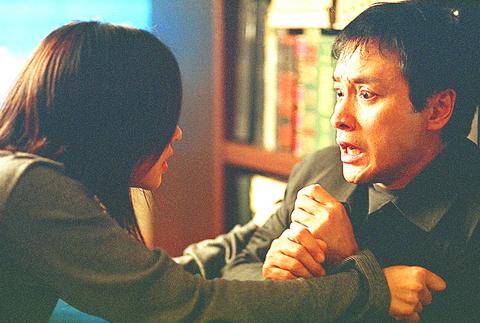Ghost films have become a trend in Hong Kong filmmaking and something a money making machine at the box office. But making all this "ghost money" might, for the superstitious Hong Kong film industry, have inauspicious effects.
In Inner Senses (

PHOTO COURTESY OF GROUP POWER
According to Hong Kong media, making this ghost film might have damaged Cheung's acting career, which is currently in transition as he angles to become a film director.
In the film, Cheung plays a psychiatrist who is treating Lam, a young woman suffering from constant hallucinations and panic attacks. Cheung convinces himself that the symptoms are caused by Lam's traumatized family life and her love affairs, and that by falling in love with her, he will be able to rescue her from falling into a psychological black hole.
Then the inconceivable happens. The psychiatrist starts to see the ghost of his high school girlfriend who committed suicide 20 years ago when he broke up with her.
In real life as in the film, Cheung (who established a reputation for his roles in Farewell My Concubine and Days of Being Wild), has been reported suffering from depression. Although his role in Inner Senses earned him a nomination for a Golden Horse award last November, this does not seem to have lifted his mood.
During the shooting of Inner Senses, the 46 year-old actor was reported as being "too involved" in his role for this film and was suffering from insomnia as a result. And now, Cheung has turned down all promotional appearances for health reasons even as the film is getting ready for commercial release in Hong Kong, Japan, Korea and Taiwan. During his few public appearances Cheung has looked pale and weak.
Speculation has been mounting in the Hong Kong media. It's been reported that the actor has been worried that his screen image is not youthful and beautiful anymore, and signs of baldness have been commented on in recent years.
Cheung began his career as an actor and pop singer in 1978, and has always been portrayed as a handsome, clean-cut leading man. His current depression has been attributed to a crisis in his 17-year relationship with his boyfriend, the mysterious Mr. Tang. The official reason is that Cheung is taking a course of Chinese medicines and it is inconvenient for him to travel.
Whatever the reason may be, many on-going projects have been affected. Cheung recently canceled such filmmaking projects as Beautiful Shanghai (
His own production company, Dream Team (夢幻聯隊), was preparing to shoot Stealing Heart (偷心), to be directed by himself and starring two Chinese actors, Hu Jun (胡軍) and Ning Jing (寧靜), but even this personal project has been temporarily abandoned.
Has the making of Inner Sense put a hex on Cheung? This is what the gossip rags are asking, and ghosts and lost love are definitely more exciting than a career that has been involved in an extended downswing.

A vaccine to fight dementia? It turns out there may already be one — shots that prevent painful shingles also appear to protect aging brains. A new study found shingles vaccination cut older adults’ risk of developing dementia over the next seven years by 20 percent. The research, published Wednesday in the journal Nature, is part of growing understanding about how many factors influence brain health as we age — and what we can do about it. “It’s a very robust finding,” said lead researcher Pascal Geldsetzer of Stanford University. And “women seem to benefit more,” important as they’re at higher risk of

March 31 to April 6 On May 13, 1950, National Taiwan University Hospital otolaryngologist Su You-peng (蘇友鵬) was summoned to the director’s office. He thought someone had complained about him practicing the violin at night, but when he entered the room, he knew something was terribly wrong. He saw several burly men who appeared to be government secret agents, and three other resident doctors: internist Hsu Chiang (許強), dermatologist Hu Pao-chen (胡寶珍) and ophthalmologist Hu Hsin-lin (胡鑫麟). They were handcuffed, herded onto two jeeps and taken to the Secrecy Bureau (保密局) for questioning. Su was still in his doctor’s robes at

Last week the Democratic Progressive Party (DPP) said that the budget cuts voted for by the China-aligned parties in the legislature, are intended to force the DPP to hike electricity rates. The public would then blame it for the rate hike. It’s fairly clear that the first part of that is correct. Slashing the budget of state-run Taiwan Power Co (Taipower, 台電) is a move intended to cause discontent with the DPP when electricity rates go up. Taipower’s debt, NT$422.9 billion (US$12.78 billion), is one of the numerous permanent crises created by the nation’s construction-industrial state and the developmentalist mentality it

Experts say that the devastating earthquake in Myanmar on Friday was likely the strongest to hit the country in decades, with disaster modeling suggesting thousands could be dead. Automatic assessments from the US Geological Survey (USGS) said the shallow 7.7-magnitude quake northwest of the central Myanmar city of Sagaing triggered a red alert for shaking-related fatalities and economic losses. “High casualties and extensive damage are probable and the disaster is likely widespread,” it said, locating the epicentre near the central Myanmar city of Mandalay, home to more than a million people. Myanmar’s ruling junta said on Saturday morning that the number killed had